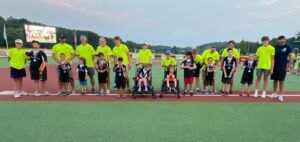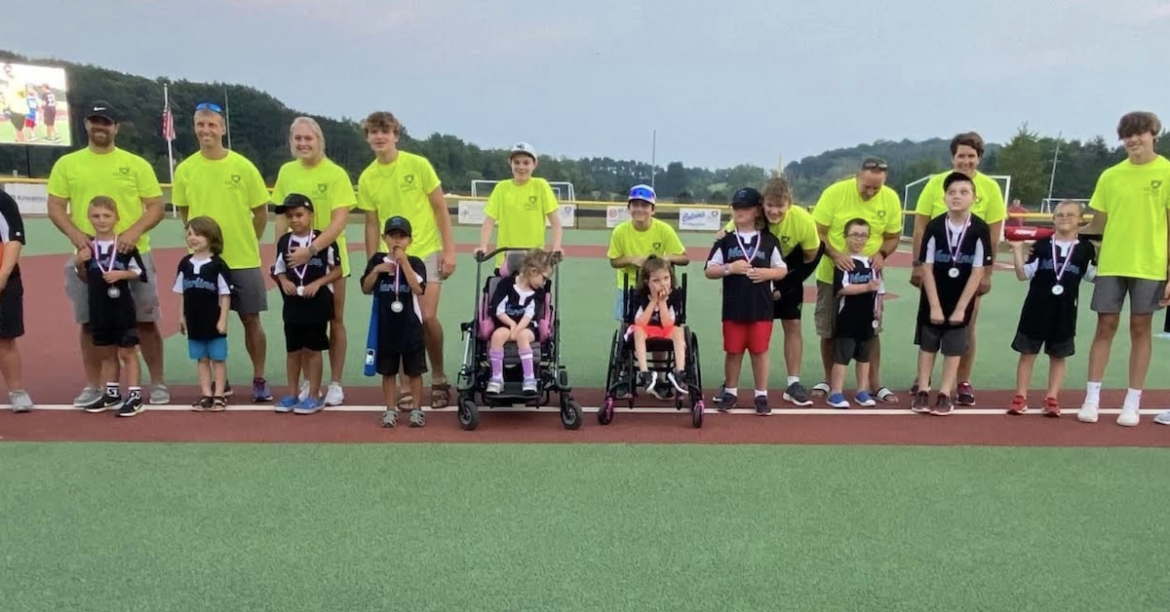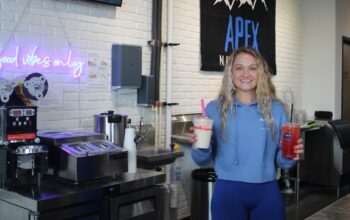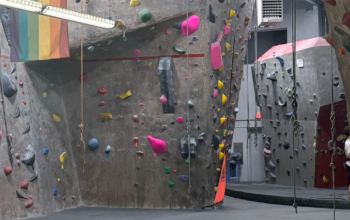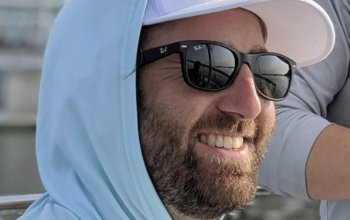“I remember winning that national tournament in Dallas, Texas. The buzzer hit zero and we all threw our sticks and gloves in the air,” said Jake Vanderbloemen. “We were acting like we won the Stanley Cup.”
That memory is a standout for Vanderbloemen, a 31-year-old alumnus and coach of the Madison Timberwolves Special Hockey Team and a person with autism.
Madison is known as the home of the Badgers and one of the Big Ten’s leaders in both athletics and academics, but it’s also trying to become known for offering opportunities in adaptive sports for people with disabilities. With adaptive baseball, wheelchair basketball and accessible hockey teams, Dane County is slowly growing its sports teams to be more inclusive. These sports teams have been created to give people who aren’t usually included the chance to shine and build a community with people who share similar experiences.
“It is so much more than just being a part of a team. It’s a social outlet,” said Amy Spangler, head coach of MadCity Wheelchair Sports. “They finally get to be around a group of kids who live life going through the same challenges and viewpoints that they see the world through. It builds independence and confidence.”
The adaptive sports teams in the area often share a common goal: building communities for people with disabilities. The Miracle League of Dane County is a baseball organization in Cottage Grove that was founded with this goal in mind.
“[The goal is to] have fun, laugh and enjoy things, build self-confidence and really realize that no boundary defines them. If you go out and try it, chances are you’re going to be able to see that you can do more than what you think you can,” said Bill Schultz, executive director and founder of the Miracle League of Dane County.
The self-confidence can quickly be passed on through teammates, which is something Vanderbloemen has seen in his 17 years of experience.
“I kind of see myself as a teammate/teacher. I can relate to them. They can see me and say, ‘All right, if Jake had that much success, then you know, I could definitely, too,’” Vanderbloemen said.
Not only do these teams influence the players’ self-esteem, but they also benefit their parents and other community members. These teams can build communities among the fans and families that enjoy the game as much as the athletes. It also can create outlets for people to volunteer and help with the teams as an act of kindness and service.
“It is even important for the families because the parents have a support system around them of other parents who have to deal with the same kinds of things,” Spangler said. “They give each other not only support but ideas and recommendations on where they can go for certain things that they need.”
As far as how the game is played, many of the teams have different rules to make the game more accessible. For example, the Miracle League only plays two innings, and each athlete has a buddy to help them on the bases and in the field. The Badgers Give Back program even adopted a Miracle League team of its own.
Another difference in the game itself is in wheelchair basketball, where the players have to sub out so that everyone gets an equal opportunity to play. This is different from non-adaptive basketball where the best five players can play a majority of the time.
“There is a lot more strategy than there is in stand-up — or, as the disability world refers to it — ‘able-bodied basketball.’ So I like that it’s different. In able-bodied basketball, you can have one really good athlete, and they can just out-jump and out-run everybody else on the court,” Spangler said.
The coaches also take pride in helping the team and bringing these new opportunities to Dane County. Many of them started coaching because either themselves or a loved one has a disability.
“It is certainly one of the things I’m the most proud of in my life,” said Hal Bennett, coach of the Madison Timberwolves Special Hockey Team. “I feel very good about it, and my wife does as well–for [our son] Elliot, and then for the community. One thing that we didn’t anticipate as much when we started is how much of a community it has proven to be. There’s a lot of bonding between athletes.”
Some of the athletes with disabilities have also stepped up to coach their own teams, like Vanderbloemen.
“I found that at a tournament, the players really responded well to what I was talking about. I think they kind of realized, ‘He’s our coach, but he’s also one of us,’” Vanderbloemen said.
However, the teams face many challenges as well, mostly in funding. It is difficult for many of the players to be able to afford to play on these teams, especially when they travel for tournaments.
“Equipment is not cheap,” Spangler said. “Our program does have chairs that if kids want to get started, we can fit them in a chair and they can borrow a program chair for a while. But when families decide that they want to buy their child their own chair, something that’s better than what the program has, it’s an easy $4,000 to $5,000 to get a chair for them to play basketball in.”
But if they can find help for funding and grants, people are often excited to help the teams stay afloat. The Miracle League of Dane County was presented with an amazing opportunity to build their field that was too good to pass up.
“We were fortunate with the village of Cottage Grove, where they had an existing park and they gave us the square footage we needed for a $1-a-year lease,” Schultz said. “They just fell in love with the Miracle League concept. Most leagues have to find and buy land.”
Because this deal was exceptional, Schultz said leagues may not find something similar anywhere else. Some other teams have to fundraise more than $1 million just to purchase space to build and play, he added.
One of the other struggles of the teams is gathering enough players to form a team. Word of mouth is important in helping people gain knowledge about the opportunity, so teams are always focused on finding ways to share their organization with the community.
“Our program is so small. We usually don’t have enough players to have a prep team and a varsity team,” Spangler said. “So, I have a 10-year-old who plays on the varsity team because we don't have anybody else who’s eligible for prep at this time.”
They also face the challenge of other teams popping up in the area. Because so many players travel to make it to practices, if an opportunity arises closer to their hometown, they often switch teams.
“I don’t like to see programs fold. It happens too much in our sport. Three new ones will start up but in the process, two others fold because they don’t have enough players or they don’t have the funding,” Spangler said. “I don’t like seeing opportunities taken away from kids.”
The Miracle League of Dane County has the opposite problem — it is running out of space and needs to expand.
“Our first season was in 2021. The children that play are ages four to 19 and they can have any type of disability. We expected about 50 kids and we got 90. The second year we expected 140 and we got 200. Last year, we jumped up. Next year, we decided to add an adult league on Saturday mornings,” Schultz said.
Overall, the teams are about passion. These teams were created to expand the potential and possibilities of disabled people across Dane County and Wisconsin.
“It is challenging, but also very rewarding,” Bennett said. “I think that one of the things that’s made that program so good is the passion a lot of individuals who play have. Many of them have family members who played hockey and are just really happy to be out playing themselves.”
Looking ahead, athletes and coaches hope that these teams can continue to provide opportunities for anyone who wants to play or volunteer.
“Not every special needs athlete is going to be able to play on a varsity high school team. Whether they’re physically unable to or they wouldn’t be accepted by their other teammates who may not have a disability,” Vanderbloemen said. “But for disabled hockey, it’s the coolest thing because everyone has something that makes them special and unique.”
If you are interested in learning more about the adaptive teams in the Madison area, look here:
